Catholic Church
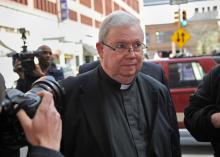
Monsignor William J. Lynn, the first U.S. Catholic official convicted for covering up the sexual abuse of children, was sentenced to 3-6 years in prison on Tuesday.
Lynn, 61, has been in jail since his June 22 conviction on endangering the welfare of a child. Prosecutors were seeking the maximum penalty, up to seven years.
“You knew full well what was right, Monsignor Lynn, but you chose wrong,” said Common Pleas Court Judge M. Teresa Sarmina.
Sarmina told Lynn that he enabled “monsters in clerical garb … to destroy the souls of children, to whom you turned a hard heart.”
Lynn was head of priest personnel for a dozen years and was one of the highest-ranking officials in the Archdiocese of Philadelphia.

Amid a battle with President Obama over a new contraception mandate, the nation's Roman Catholic bishops are promoting natural family planning -- but will their flock take heed?
When the Obama administration in January announced that employers will have to provide contraception coverage to their employees, U.S. Catholic bishops took the lead in fighting the mandate.
Allied with other denominations, the Catholic hierarchy has organized an energetic, nationwide effort to overturn this new federal rule. The Catholic Church calls birth control a sin, even as many Catholics practice it.
The bishops are hoping to change that with their Natural Family Planning Awareness Week, an annual campaign that begins this Sunday (July 22). It’s the church’s only acceptable form of birth control, even as many sexuality educators consider it relatively unreliable.
Natural Family Planning Awareness Week, then, may provide a window into a church teaching that is helping to drive the most serious standoff between the church and the federal government in decades.
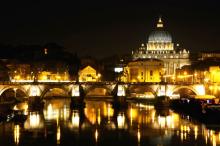
Influential church historian Diarmaid MacCulloch said he believes Christianity faces a bright future, but predicted the Roman Catholic Church will undergo a major schism over its moral and social teaching.
"Christianity, the world's largest religion, is rapidly expanding — by all indications, its future is very bright," said MacCulloch, 60, professor of church history at Oxford University and an Anglican deacon. His latest book, Silence in Christian History, will be published in the fall by Penguin.
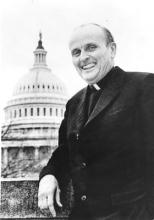
A popular online advice columnist has said that the late Rev. Robert Drinan, a famed Jesuit priest and onetime Democratic congressman from Massachusetts, tried to kiss and fondle her in the 1970s when she was 18 or 19 years old.
Emily Yoffe, who writes Slate’s “Dear Prudence” column, said she was prompted to write her first-person account after reading coverage of the trial of Jerry Sandusky, the former Penn State assistant football coach who is charged with raping and molesting 10 boys.

Religious groups have long vied for prime parcels of land, planting churches on town squares and monasteries amid isolated mountains. But now they’re targeting real estate in a less tangible sphere: cyberspace.
For the first time in its history, the international nonprofit that doles out generic Internet domain names such as “.com” and “.edu” will allow more specific web address extensions like “.church.”
Hundreds of companies, Internet entrepreneurs and cities submitted nearly 2,000 applications, seeking the right to own everything from .app to .zulu, the Britain-based International Corporation for Assigned Names and Numbers announced last on June 14.
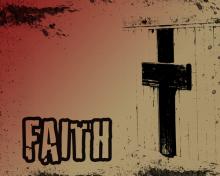
I have a confession to make.
A while back, I was applying for an editing job with a fairly prominent Christian media company, and in the application process, I was asked to sign a statement of faith. For those unfamiliar, this is a list of things that the organization in question claims to believe, and they ask all who are interested in being a part of it to sign their name, claiming their personal agreement with and belief in the exact same things.
Truth be told, I needed the job. So even though I didn’t actually agree with several points in the statement of faith, I signed it. Turns out I didn’t get the job anyway, so I compromised myself for pretty much nothing.
I had another organization approach me recently about publishing some of my work. They’ve followed my writing for some time and thought that my content would add something valuable to their community. In most cases, when I give permission to folks to “repost” my stuff, it involves little more than a verbal agreement about what they plan to do with my articles. But this one came with two separate agreements I was asked to sign before moving forward.
There, in the middle of both agreements, were the same statements of faith, nearly mirroring word-for-word the one I had disingenuously signed the first time when the job was at stake. But this time, I thought twice about it. I wrote them and explained that, although I’d be happy to work with them, I couldn’t sign their faith doctrine agreement in good conscience.

Amy and I have been working (translated: watching lazily) our way through the first several seasons of Mad Men. The writing is remarkably subtle, and I was particularly struck by the fact that such a long-standing show could effectively have little or no plot focusing instead on rich character development.
For a writer, this is like enjoying a gourmet meal every night.
But the cherry on top for me is the sprinkling of anachronisms that apparently made plenty of sense at the time, but which are shockingly out of place now. There was a scene of the main family in the park, and when they’re done, the mother gives the blanket a good flick and leaves all of their trash wherever it falls. There’s also the constant smoking, even around kids and by pregnant wives (the perfect antidote for nausea, apparently), drinking at work and brazenly racist comments as the cultural norm.
Hard to believe sometimes that this took place so recently that my parents were teenagers when it took place.
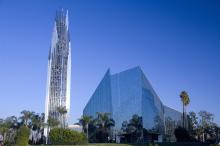
In a building swap, the Crystal Cathedral has announced it will move its congregation to a smaller Roman Catholic church after the iconic Protestant megachurch was sold to the Catholic Diocese of Orange, Calif.
The cathedral, plagued by huge debt and squabbles among family members of founder Robert H. Schuller, will move to a space with less than half of its current seating capacity. Sheila Schuller Coleman, Schuller’s daughter and the recent pastor at the cathedral, started a new church nearby in March.

Under new rules announced on Wednesday (May 2), the Vatican will more closely oversee the operations of Caritas Internationalis, a global confederation of 162 national Catholic charities. The decision comes after the Vatican last year vetoed the re-election of the organization's then-secretary general, Lesley-Anne Knight, complaining of a lack of coordination with Vatican officials.
The new rules issued by the Vatican secretary of state, Cardinal Tarcisio Bertone, will require all Caritas Internationalis officials make a formal promise of fidelity to church teachings and leaders.
Forests throughout North America would not be the same today without the trailblazing work of a small Mohawk Catholic community in Quebec.

CLEVELAND--In an extraordinary move, the Vatican has reversed the closure of 13 churches in the Diocese of Cleveland, saying the parishes must be restored and the sanctuaries reopened for worship, according to activists who fought the closings.
The diocese and Bishop Richard Lennon, who ordered the closures as part of a downsizing plan in 2009 and 2010, could appeal the reversals.
The 13 parishes had filed appeals with the Vatican after Lennon closed 50 churches, citing changes in demographics and shortages of priests and cash.
Since the closings, parishioners have been swamping Rome with flurries of letters, arguing that their parishes were vibrant communities wrongfully snuffed out by the diocese.

ST. LOUIS -- Lutherans and Catholics are not historically known for their theological sympathy, but earlier this month the president of the Lutheran Church-Missouri Synod told the U.S. House that he will "stand with our friends in the Catholic Church" in opposition to a recent government ruling on contraception.
History aside, the Rev. Matthew Harrison made it clear that the Missouri Synod now has "large consensus with the Roman Catholic Church on moral issues."
"The Christian church is a billion times beyond the Missouri Synod," Harrison said. "Without the Roman Catholic Church in this country, our way would be infinitely more difficult."
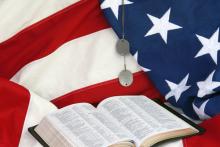
Does theology matter when it comes to evaluating political leaders? How does this whole faith and politics thing work?
Both Barack Obama and Rick Santorum have strong records on supporting legislation and funding policies that fight global poverty and pandemic diseases. Both men have talked about how their concern for the poor is motivated by their faith.
I feel comfortable with that and I think most people do. It is an example of political figures expressing their personal motivation behind widely held values that aren’t exclusive to a particular religious tradition.
There are some religious beliefs, such as a particular stance on infant baptism, understanding of the Trinity, or belief in what occurs when Christians observe the Lord’s Supper that are significant theological claims. But they aren’t good or appropriate benchmarks by which to evaluate political candidates.
VATICAN CITY — Ten years after the clergy sexual abuse scandal erupted in the United States, Catholic bishops from all over the world will meet next week at a Vatican summit aimed at preventing abuse and protecting children.
The conference, "Towards Healing and Renewal," will be held on Feb. 6-9 and is organized by the Jesuit-run Gregorian University in Rome.
The Vatican's top spokesman, the Rev. Federico Lombardi, told reporters on Friday (Feb. 3) that the summit enjoys the "full support and participation" of the Vatican's highest offices, but Pope Benedict XVI is not expected to attend.
Monsignor Charles Scicluna, the Vatican's chief abuse prosecutor, said the protection of children must become "a permanent principle and concern" in every decision of the church.
"There cannot be a distinction between the good of the church and the protection of youth," he said Friday.
Despite the enormous success of lay involvement and Catholic outreach to the world, several trends indicate serious challenges for the Catholic Church in the United States.
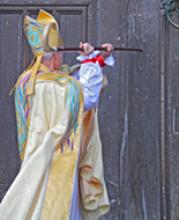
The real Dunder Mifflin Paper Co., the goods and evils of the pepper-spraying cop, N.T. Wright's fiery predecessor, the belt of the Virgin Mary closes Russian tour, Parker J. Palmer, and more.

GOP Candidates Show Sharp Differences On National Security And Terrorism; GOP Debate: Romney Aide Struggles To Answer Immigration Question While Attacking Gingrich; Occupy Pessimism; Occupying The Gospel; An America Less Friendly To Christians? Not In This Campaign Supercommittee Failure Confirms What Most Americans Believe About Congress; Evangelicals Assert Their Role In GOP Primary; Occupy Thanksgiving.
Two Muslim Americans resopnd in different ways to TLC's All-American Muslim; authors honored at 2011 National Books Awards; solar organizations introduce Occupy Rooftops; how cloud seeding effects water shortages and weather systems; Google's new music store; and much more.